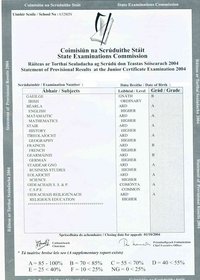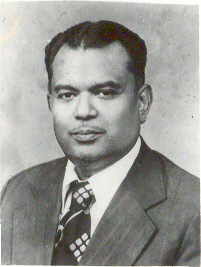Abitur is a qualification granted at the end of secondary education in Germany, Lithuania, and Estonia. It is conferred on students who pass their final exams at the end of ISCED 3, usually after twelve or thirteen years of schooling. In German, the term Abitur has roots in the archaic word Abiturium, which in turn was derived from the Latin abiturus.
The General Certificate of Education (GCE) is a subject-specific family of academic qualifications that awarding bodies in England, Wales, Northern Ireland, Crown dependencies and a few Commonwealth countries, notably Cyprus, Sri Lanka, Pakistan, Malaysia and Singapore, confer on students..

Matriculation is the formal process of entering a university, or of becoming eligible to enter by fulfilling certain academic requirements such as a matriculation examination.

In France, secondary education is in two stages:

Education in Singapore is managed by the Ministry of Education (MOE). It controls the development and administration of state schools receiving taxpayers' funding, but also has an advisory and supervisory role in respect of private schools. For both private and state schools, there are variations in the extent of autonomy in their curriculum, scope of taxpayers' aid and funding, tuition burden on the students, and admission policy.

The Junior Certificate or "Junior Cert" for short, is an educational qualification awarded in Ireland by the Department of Education to students who have successfully completed the junior cycle of secondary education and achieved a minimum standard in their Junior Certificate Examination. These exams, like those for the Leaving Certificate, are supervised by the State Examinations Commission. A "recognised pupil" who commences the Junior Cycle must reach at least 12 years of age on 1 January of the school year of admission and must have completed primary education; the examination is normally taken after three years' study in a secondary school. Typically a student takes 9 to 13 subjects – including English, Irish and Mathematics – as part of the Junior Cycle. The examination does not reach the standards for college or university entrance; instead, a school leaver in Ireland will typically take the Leaving Certificate Examination two or three years after completion of the Junior Certificate to reach that standard.
The Secondary School Certificate, also called SSC or Matriculation examination, in madrasah education Dakhil is a public examination in India, Bangladesh and Pakistan conducted by educational boards for the successful completion of the secondary education exam in these countries. Students of 10th grade/class ten can appear in these. It is equivalent to GCSE in England and first two years of high schools in United States.
Tenth grade or grade 10 is the tenth year of school post-kindergarten or the tenth year after the first introductory year upon entering compulsory schooling. In many parts of the world, the students are 15/16 years of age, depending on when their birthday occurs. The variants of 10th grade in various countries are described below.

The International General Certificate of Secondary Education is an English language based examination similar to GCSE and is recognized in the United Kingdom as being equivalent to the GCSE for the purposes of recognizing prior attainment. It was developed by University of Cambridge International Examinations. The examination boards Edexcel and Oxford AQA also offer their own versions of International GCSEs. Students normally begin studying the syllabus at the beginning of Year 10 and take the test at the end of Year 11. However, in some international schools, students can begin studying the syllabus at the beginning of Year 9 and take the test at the end of Year 10.

Education in Bangladesh is overseen by the country's Ministry of Education. The Ministry of Primary and Mass Education is responsible for implementing policy for primary education and state-funded schools at a local level. In Bangladesh, all citizens must undertake twelve years of compulsory education which consists of eight years at primary school level and four years at high school level. Primary and secondary education is financed by the state and free of charge in public schools.

St. Anthony's Canossian Secondary School (SACSS) is a girls' secondary school located in Bedok, Singapore. It is part of the Canossian family of Catholic girls' schools in Singapore.
The A Level is a subject-based qualification conferred as part of the General Certificate of Education, as well as a school leaving qualification offered by the educational bodies in the United Kingdom and the educational authorities of British Crown dependencies to students completing secondary or pre-university education. They were introduced in England and Wales in 1951 to replace the Higher School Certificate. A number of countries, including Singapore, Uganda, Kenya, Mauritius and Zimbabwe have developed qualifications with the same name as and a similar format to the British A Levels. Obtaining an A Level, or equivalent qualifications, is generally required for university entrance, with universities granting offers based on grades achieved.

Harris Sam Sahayam Lawrence was an Indian educationalist born in Nagercoil, Tamil Nadu.

The Board of Intermediate Education, Andhra Pradesh (BIEAP) is a board of education in Andhra Pradesh, India. Established in 1971, it was located in Hyderabad, situated in the composite Andhra Pradesh state. The board is now located in Vijayawada after state reorganization in 2014. The board offers two-year courses in 85 streams and courses and conducts examinations.
All India Secondary School Examination, commonly known as board exams, is a centralized public examination that students in schools affiliated with the Central Board of Secondary Education in India take after class 10. The board conducts the examination during the period of February every year even after implementing the ambitious project of Continuous and Comprehensive Evaluation. Now that the board has ended the Continuous and Comprehensive Evaluation pattern as a result Joint Employment Test, NEET, etc., the exam is conducted by the National Testing Agency instead. In this exam, mathematics, science and S.S.T. are compulsory with any two languages. Students can also opt skill subject such as information technology, painting, yoga, or artificial intelligence. Successful candidates are awarded the Secondary School Completion Certificate, a Statement of Marks, and a Migration Certificate stating that the candidate has completed Secondary Schooling and can pursue higher education. For the 2016-17 academic year, the Central Board of Secondary Education has revived the old system of syllabus and marking scheme India has state exams and central exams.

Madhya Pradesh Board of Secondary Education is a board of school education in Madhya Pradesh State of India.
The Board of Secondary Education, Andhra Pradesh abbreviated BSEAP also known as Directorate of Government Examinations, Andhra Pradesh. It was established in 1953 and functions as an autonomous body under the Andhra Pradesh's Department of Education.
The Mizoram Board of School Education (MBSE) is an autonomous governmental body for academic administration in Mizoram, India, having its jurisdiction from elementary to higher secondary education. It was established by the Government of Mizoram in 1975 by the Mizoram Board of School Education Act. It has the power to regulate, supervise and control school education in Mizoram. Its primary function is to prepare academic programmes and organise examinations, especially for state level High School Leaving Certificate (HSLC) and Higher Secondary School Leaving Certificate (HSSLC). From 2012, the board also conducts State Technical Entrance Examination (STEE) for entry into technical courses such as engineering, medicine, veterinary science, pharmacy, nursing, homoeopathy, and dentistry.

Jharkhand Academic Council, is an state government agency responsible for academic administration in the state of Jharkhand, India. The agency is amended to supervise the government recognized academic institutions, including primary and higher secondary schools. It was established by the government of Jharkhand after the enactment of the Jharkhand Academic Council Act, 2003 by the state legislature and governor. JAC was primarily constituted for conducting intermediate, secondary, and madrasa-level examinations of the candidates registered with government-recognized institutions (JAC-affiliated).











